The economic crisis that began in 2008 has put workers’ control and workplace democracy back on the agenda in the countries of the northern hemisphere.
.jpg)
DARIO AZZELLINI
TUE, 15/09/15
https://www.workerscontrol.net/
During the first decade of the current century, factory occupations and production under workers’ control seemed to be limited mainly to South America, with a few exceptions in Asia. It was beyond the imagination of most workers and scholars in industrialized countries that workers would or could occupy their companies and run them on their own. Nevertheless, the crisis that started in 2008 put workers’ control back on the agenda in the northern hemisphere. In the course of the current crisis, factory occupations occurred throughout Europe, especially in France, Italy and Spain, but also in other countries, including Switzerland and Germany, and in the US and Canada. Nevertheless, in most cases the occupation was a means of struggle and not a step toward workers’ control. In some better organized cases workers achieved their demands, in others the occupations were a result of spontaneous indignation over factory closure or mass dismissals and the struggles fell apart without any concrete result.
Compared to other historical moments when factory takeovers and workers’ control were part of offensive struggles, the new occupations and recuperations develop out of defensive situations. However, this has been true since the neoliberal attack on workers in the early 1980s, with very few exceptions like the recent struggles for worker control in Venezuela. As consequence of the crisis, occupations and recuperations are accomplished by workers in reaction to closure of their production site or company, or relocation of production to a different country. Workers try to defend their workplaces because they have little reason to hope for a new job. In this defensive situation, the workers not only protest or resign; they take the initiative and become protagonists. In the struggle and on the production site they build horizontal social relations and adopt mechanisms of direct democracy and collective decision-making. The recuperated workplaces often reinvent themselves. The workplaces also build ties with nearby communities and other movements.
This description already includes certain criteria not necessarily shared by all workers’ takeover of companies. While in fact it is fundamental to recognize the diversity of situations, contexts and modalities of workers’ controlled companies, it is nevertheless important to understand workers’ control or recuperation of workplaces as a socio-political operation and not as a mere economic procedure. Therefore, it is necessary to have some basic criteria when discussing recuperated companies. Some well-intentioned authors calculate 150 recuperated workplaces under worker control in Europe (Troisi 2013). A closer look shows that very few of these can really be considered “recuperated” and under worker control. That count includes all workers’ buyouts of which most at best adopted the structure and functioning of traditional cooperatives. Many, if not most, have internal hierarchies and individual property shares. In the worst cases we find unequal share distribution according to the company’s social hierarchy (and therefore economic power) or even external investors and shareholders (individuals and major companies). Such reckoning reduces the concept of recuperation to the continued existence of a company originally destined to close and merely changing ownership from one to many owners, some of whom work in the company. Companies following these schemes can hardly be considered “recuperated” in that they do not provide a different perspective on how society and production should be organized.
That contemporary worker-controlled companies almost always have the legal form of cooperatives is because the cooperative form is the only existing legal form of collective ownership and collective administration of workplaces. Usually, however, these are based on collective ownership, without any option of individual property; all workers have equal shares and equal voice. It is an important and distinctive characteristic that they question private ownership of means of production. They provide an alternative to capitalism based essentially on the idea of a collective or social form of ownership. Enterprises are seen not as privately owned (belonging to individuals or groups of shareholders), but as social property or “common property” managed directly and democratically by those most affected by them. Under different circumstances, this might include, along with workers, participation by communities, consumers, other workplaces, or even some instance of the state (for example in countries like Venezuela or Cuba). That workers’ control the production process and are decisive in decision-making, usually also turns them into social and political agents beyond the production process and the company (Malabarba 2013, 147).
All following examples of factories recuperated during the crisis correspond to these modalities.
Pilpa – La Fabrique du Sud
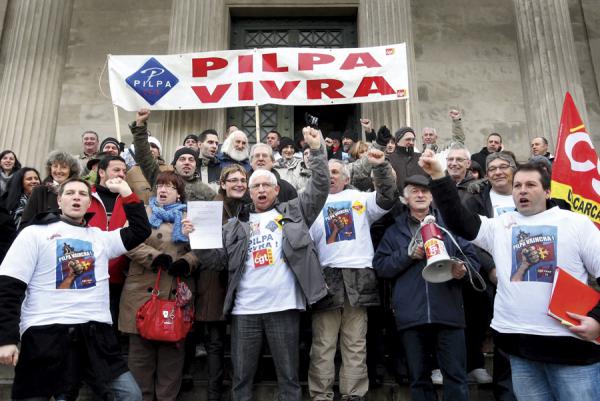
Pilpa was an ice cream producing company with 40 years of history in Carcassonne, near Narbonne, in southern France.It used to belong to the huge agricultural cooperative 3A, which sold its ice cream as different famous brands, among them the large French grocery store chain Carrefour. In September 2011, the plant was sold by 3A due to financial difficulties. The buyer, ice cream manufacturer R&R (belonging to US investment fund Oaktree Capital Management) was only interested in owning the famous brand names to add value to R&R (which would be sold by the investment fund in April 2013). In July 2012, R&R announced Pilpa would close and production relocated, with dismissal of 113 workers. The workers resisted, occupied the plant and started organizing a solidarity movement. Their goal was to save the production site (Borrits 2014).
The workers set up 24-hour surveillance to prevent the owner from dismantling the factory and removing the equipment. In December 2012 the workers gained a court declaring the proposed R&R job protection plan and workers’ pay out “inadequate.” While R&R formulated a new proposal, 27 workers decided on a plan to turn the former Pilpa into a worker owned and worker controlled cooperative under the name “Fabrique du Sud” (Factory of the South).
The new owner of R&R finally agreed in late spring 2013 to pay all workers between 14 and 37 months’ gross salaries and €6,000 for job training. Moreover it agreed to pay the cooperative more than €1 million in financial and technical assistance for job training and market analysis and hand over the machines for one production line, with the condition that Fabrique du Sud would not operate in the same market. The municipality of Carcassone agreed to buy the land upon which the factory is built (Borrits 2014). As former Pilpa worker and Fabrique du Sud founder, Rachid Ait Ouaki, explains, it was not a problem to agree not to operate in the same market:
“We will produce ice cream and yogurt, both eco-friendly and of higher quality. We will use only regional ingredients – from milk to fruit – and also distribute our production locally. At the same time, we will keep prices for consumers low. We will not be producing 23 million liters annually as Pilpa did, but only the 2-3 million liters we can distribute locally. We also have only 21 of the original workers who joined the cooperative, since we have to put even more money into it, including raising our unemployment benefits through a program for business creation, and not everyone wanted to take that risk”.
As in other cases, the cooperative is the legal form the worker controlled company had to take. Decisions are made by all the workers together and benefits will be distributed equally among the workers, once production starts in early 2014.
From Maflow to Ri-Maflow
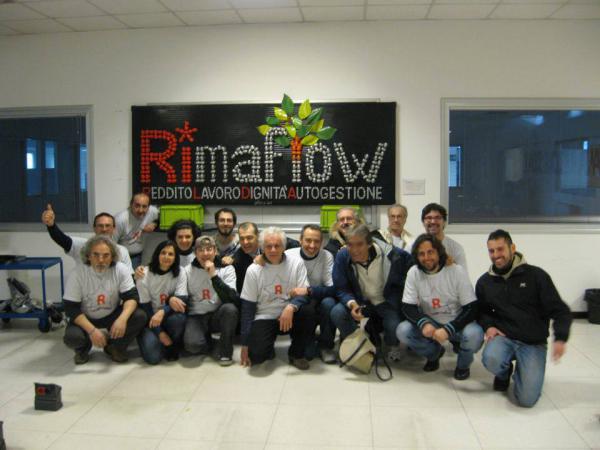
The Maflow plant in Trezzano sul Naviglio, industrial periphery of Milan, was part of the Italian transnational car partsproducer Maflow, which advanced in the 1990s to one of the most important manufacturers of air conditioning tubes worldwide with 23 production sites in different countries. Far from suffering consequences of the crisis and with enough clients to keep all plants producing, Maflow was put under forced administration by the courts in 2009 because of fraudulent handling of finances and fraudulent bankruptcy. The 330 workers of the plant in Milan, Maflow’s main production facility, began a struggle to reopen the plant and keep their jobs. In the course of the struggle they occupied the plant and held spectacular protests on the plant’s roof. Because of their struggle Maflow was offered to new investors only as a package including the main plant in Milan. In October 2010 the whole Maflow group was sold to the Polish investment group Boryszew. The new owner reduced the staff to 80 workers. 250 workers passed to a special income redundancy fund. But even so the new investor never restarted production and after the two years required by the law preventing him from closing a company bought under these circumstances, in December 2012 the Boryszew group closed the Maflow plant in Milan. Before closing it removed most machinery (Blicero 2013, Occorso 2013 and Massimo Lettiere).
A group of workers in redundancy had kept in touch and was unwilling to give up. Massimo Lettiere, former Maflow worker and union delegate of the leftist and radical rank and file union Confederazione Unitaria di Base (CUB) explains:
“We went on organizing assemblies from the Boryszew take-over. In some of the assemblies we talked about the possibility of taking the plant and doing some work inside. We did not know exactly what kind of work we could do, but we understood that after so much time of redundancy, the next stage would be unemployment. Therefore we did not have any option and we had to try it. In the summer of 2012 we had already done some market studies and determined that we would set up a cooperative for recycling of computers, industrial machines, and domestic and kitchen appliances”.
When the plant was closed in December 2012, the workers occupied the square in front of their former factory and in February 2013 they went inside and occupied the plant, together with precarious workers and former workers of a nearby factory shut down after fraudulent bankruptcy:
“To stand and wait for someone to give you a hand is worthless. We must take possession of the goods that others have abandoned. I am unemployed. I cannot invest the money to start a business. But I can take a factory building that has been abandoned and create an activity. So our first real investment for the project is activity and political action. We made a political choice. And from there we started working”.
In March 2013, the cooperative Ri-Maflow was officially constituted. Meanwhile the factory building passed to the Unicredito Bank. After the occupation Unicredito agreed to not request eviction and permitted them free use of the building. The 20 workers participating full time in the project completely reinvented themselves and the factory, as Lettiere describes:
“We started building a broader network. We had the cooperative ‘Ri-Maflow’ with the goal of recycling as the economic activity. In order to gather money we built the association ‘Occupy Maflow’, which organized spaces and activities in the plant. We have a flea market in one hall, we opened a bar, we organize concerts and theater… we have a co-working area with offices we rent. With all that we started having a little income and we could buy a transporter and a pallet carrier for the cooperative, refit the electricity network and pay us some €300-€400 each a month. It was not much, but added to €800 unemployment you have almost a normal salary…
In 2014 we want to work on a larger scale with the cooperative. We have two projects we already started and both are linked to questions of ecology and sustainability. We have built alliances with local organic agricultural producers, opened a group for solidarity shopping and have contacted the agricultural cooperatives from Rosarno, Calabria, Southern Italy. They are cooperatives paying fair wages. Three or four years ago there was a rebellion of migrant workers in Rosarno. They stood up against exploitation. We buy oranges from these cooperatives and sell them and we produce orange and lemon liqueur. We are also connected with a group of engineers from the Polytechnic University to make huge recycling projects. It might take some years until we get all necessary permits. We chose this kind of activity for ecological reasons, reduction of waste etc. and we have already started recycling computers, which is easy, but we want to do it on a bigger scale.”
What can seem like a patchwork to traditional economists is in fact a socially and ecologically useful transformation of the factory with a complex approach based mainly on three premises: “a) solidarity, equality and self-organization among all members; b) conflictive relationship with the public and private counterparts; c) participation in and promotion of general struggles for work, income and rights” (Malabarba 2013, 143).
Greece: Vio.Me from industrial glue to organic cleaners
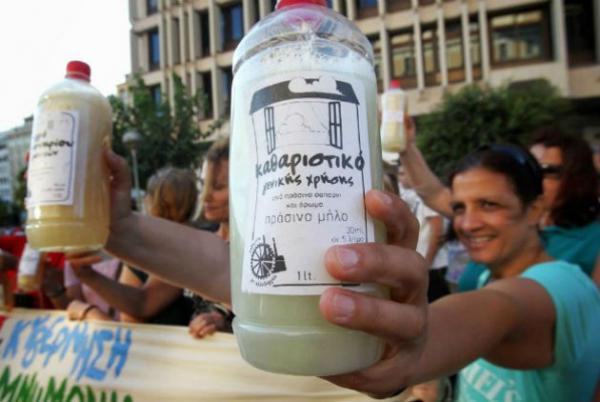
Vio.Me in Thessaloniki used to produce industrial glue, insulant and various other chemically produced building
materials. Since 2010 the workers agreed to be sent on unpaid leave every four to six weeks. Then the owners started reducing the workers’ wages, but assured them it was only a temporary measure and they would soon be paid the missing salaries. The owners’ main argument was that profits had fallen 15 to 20 percent. When the owners did not keep their promise to pay the unpaid back wages, the workers went on strike demanding to be paid. As a response to their struggle the owners simply gave up the factory in May 2011, leaving 70 unpaid workers behind. Later the workers found out that the company was still making profits and the “losses” were due to a loan that Vio.Me formally granted to the mother firm Philkeram Johnsosn. In July 2011 the workers decided to occupy the plant and take their future in their own hands (see chapter 10 on Greece for more details on Vio.Me in? context). As Vio.Me-worker Makis Anagnostou, Thessaloniki explains:
“When the factory was abandoned by the owners we first tried to negotiate with the politicians and the union bureaucracy. But we understood quickly that the only thing we were doing was wasting our time and slowing down the struggle. It was a difficult time; the crisis was showing sudden and intense effects. The suicide rate among workers in Greece rose a lot and we were worried that some of our fellow workers might commit suicide. Therefore we decided to open our labor conflict to society as a whole and the people became our allies. We discovered that the people we thought could not do anything in reality can do it all! Many workers did not agree with us or did not continue the struggle for other reasons. Among those of us who we took up the struggle, the common ground for our work is equality, participation and trust.”
Vio.Me became known internationally and inspired several other workers’ occupations in Greece, even if none was successful at keeping the workplace and/or production. The case best known internationally was the state-owned public broadcasting company, ERT (Ellinikí Radiofonía Tileórasi). After the government announced on June 11, 2013 that all public TV and radio stations would be closed (to be restructured and reopened with fewer workers, fewer rights and lower wages) workers and employees occupied the radio and produced their own program until they were brutally evicted on September 5.
The Vio.Me workers restarted production in February 2013.
“Now we produce organic cleanser not the industrial glue we produced before. Distribution is informal, we sell our products ourselves at markets, fairs and festivals, and a lot of products are distributed through the movements, social centers and shops that are part of the movements. What we did last year is basically keep the factory active. We cannot yet say we have had a very positive outcome regarding production, distribution and sales. Earnings are quite low and not enough to maintain all the workers. Therefore some workers have lost faith, or got tired and left Vio.Me. Recently our assembly decided unanimously to legalize our status by building a cooperative“.
Common challenges for workers’ recuperations
Contemporary occupied or recuperated workplaces often face similar challenges, among are a lack of support by political parties and bureaucratic unions or even their open hostility, rejection and sabotage by the former owners and most other capitalist entrepreneurs and their representations, missing legal company forms matching with the workers’ aspirations and missing institutional framework, obstruction by institutions and little or no access to financial support and loans, even less from private institutions.
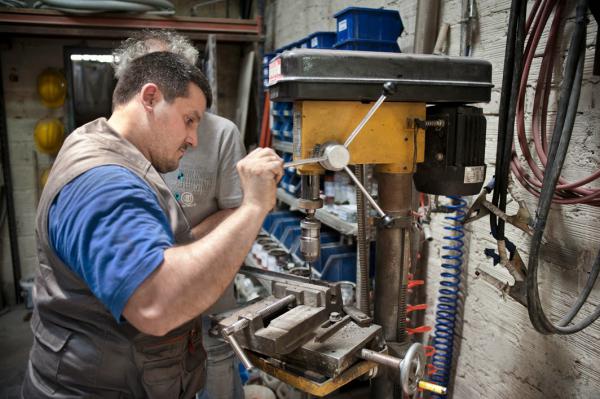
The general context contemporary recuperated factories have to face is not favorable. The occupations are taking place during a global economic crisis. Starting new productive activities and conquering market shares in a recessive economy is not an easy task. Moreover, the capital backing available for worker-controlled companies is also less than for capitalist enterprises. Usually an occupation and recuperation of a factory takes place after the owner has abandoned factory and workers, either he literally disappeared or he abandoned the workers by firing them between one day and the next. The owners owe the workers unpaid salaries, vacation days and compensations. The owners often start before the closure of the plant to remove machinery, vehicles and raw material. In such a situation, with the perspective of a long struggle without or with little financial support and uncertain outcome the most qualified workers, and often also younger workers, leave the enterprise, hoping for better options or to find a new job. The remaining workers have to acquire additional knowledge in various fields to be able to control not only the production process in a narrow sense, but also to administer the entire company, with all that implies. But once the workers take over the factory, the former owner suddenly reemerges and wants “his” business back.
Contrary to the common belief that capitalists only care about business no matter how it is done and with whom, worker-controlled businesses face not only capitalism’s inherent disadvantages for those following a different logic, but often constant attacks and hostilities by capitalist business and institutions as well as the bourgeois state. Worker-controlled companies that do not bend totally to capitalist functioning are considered a threat because they show that it is possible to work differently.
Common features of workers’ recuperations
The few known existing cases of workers’ recuperations described have huge differences. Some factories have modern machinery and are fully functional from the technical point of view. Others have been literally looted by the former owner and have to start from scratch. Some factories have encountered support from local authorities, others from unions. The common features are not a checklist for the authenticity of recuperated factories. The common features described are a repertoire of characteristics that are not necessarily all fulfilled by all recuperated factories.
All recuperation processes and recuperated factories are democratically administered. Decision-making is always based on forms of direct democracy with equality of vote among all participants, be it through councils or assemblies. These direct democratic mechanisms adopted by worker-controlled companies raise important questions, not only about individual enterprises, but about how decisions should be made throughout the whole of society. In doing so, it challenges not only capitalist businesses, but also liberal and representative “democratic” governance.
Another obvious common feature is the occupation. It means to commit an act considered illegal and therefore enter into a conflict with authorities. It is a direct action by the workers themselves. They are not “representatives” nor do they wait for a representation –a union or party– or even the institutions of the state to solve their problem before they spring into action. As Malabarba correctly states: “The action has to be turned upside down: first the initiative, you occupy, and then you get in touch with the institutions that failed more or less consciously” (Malabarba 2013, 149).
This is also confirmed by the Latin American experience. In Argentina, Brazil, Uruguay and Venezuela the workers have always been ahead of parties, unions and institutions regarding practical responses. Expropriations, nationalizations, laws, financial and technical support etc. always followed the workers’ initiative and as a reaction to their direct action and struggle. The same is true for the productive activity developed by the recuperated workplace: strictly following the law, waiting for all legal authorizations and paying taxes would simply mean the activity would never start.
Most factories have to reinvent themselves, often the prior productive activity cannot be carried out in the same way (because the machines have been taken away by the owner, because it was a highly specialized activity with very few customers, whom the workers do not have access to, or because the workers decide it for other reasons). In all better documented cases we find that ecological aspects and questions of sustainability became central, be it an orientation on recycling, as in both Italian factories, the change from industrial glue and solvents to organic cleaners in Vio.Me in Thessaloniki, or the two factories in France switching to organic products and using local and regional raw materials and also distributing their products locally and rgionally. The problematic is seen by the workers in a larger context regarding the future of the planet, as well as on a smaller scale related to health threats for workers and surrounding communities. The importance of ecological aspects is part of the new society envisioned by the workers as are the democratic practices.
The struggle of the workers and the occupied or recuperated workplace becomes also a space in which new social relations are developed and practiced: Affect reliability, mutual help, solidarity among the participants and solidarity with others, participation and equality are some characteristics of the new social relations built. New values arise or at least different values than those characterizing the capitalist production process arise. Once the workers decide, for example, safety on the job becomes a priority.
The recuperated factories usually develop a strong connection with the territory. They support the neighborhood and get support from the neighborhood. They interact with different subjectivities present in the territory and develop joint initiatives. Also connections to different social movements and social and political organizations are built and strengthened. All factories mentioned in this chapter have direct relations with social movements and especially the new movements that were part of the global uprising since 2011. This is an evident parallel to Latin America where successful factory recuperations are characterized by having a strong foothold in the territory and close relations with other movements.
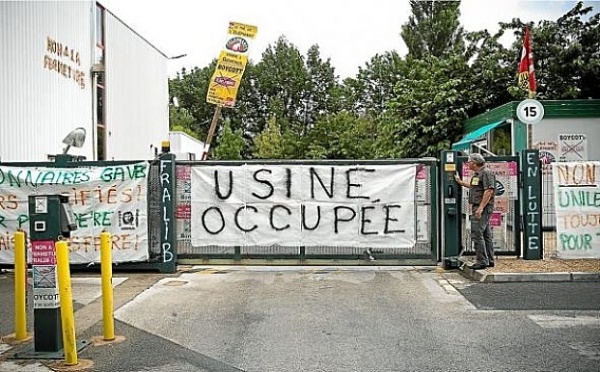
The anchorage in the territory helps also to face another important challenge: changing forms of work and production have radically diminished the overall number of workers with full time contracts, as well as reducing the number of workers in each company. While in the past job and production processes automatically generated cohesion among the workers, today work has a dispersive effect since often workers of the same company work with different contracts and with a different status. Generally more and more workers are pushed into precarious conditions and into self-employment (even if their activity depends totally on one “employer”). How can these workers be organized and what are their means of struggle? This is an important question the left must deal with to achieve victory over capital.
Ri-Maflow and Officine Zero in Italy have built strong ties with the new composition of work by sharing their space with precarious and independent workers. In the described case of Toronto, Canada, we can see a different approach to counteract the dispersive effect of work. The workers of the recuperated factories recognize themselves in each other and consider themselves part of a broader movement. The Kouta Steel Factory Workers in Egypt sent a letter in support of the Greek Vio.Me workers when they heard about their struggle. Makis Anagnostou from Vio.me declares: “The goal of the Vio.me workers is to create a European and international network with many more factories under worker control”. There is good reason to believe that this goal will become reality.
This chapter was taken from “An Alternative Labour History” | Edited by Dario Azzellini and published by Zed Books
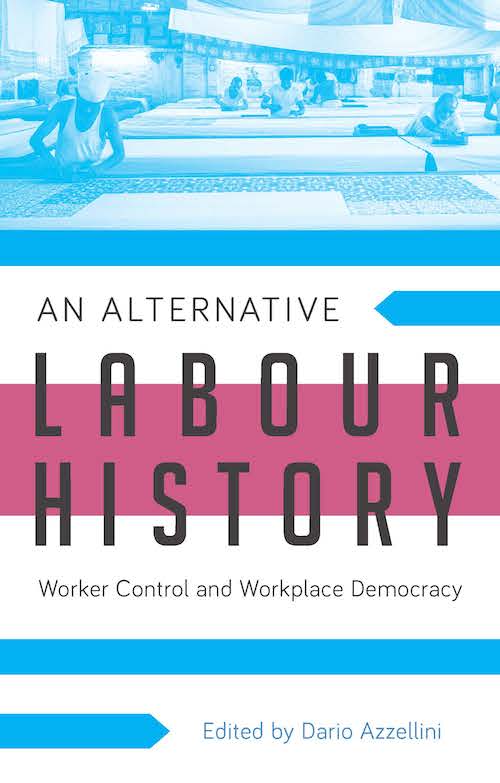
No comments:
Post a Comment